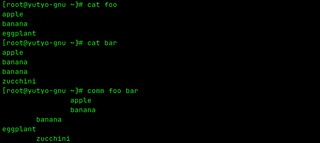Related Research Articles
uniq is a utility command on Unix, Plan 9, Inferno, and Unix-like operating systems which, when fed a text file or standard input, outputs the text with adjacent identical lines collapsed to one, unique line of text.

In computing, ls is a command to list computer files and directories in Unix and Unix-like operating systems. It is specified by POSIX and the Single UNIX Specification.

The comm command in the Unix family of computer operating systems is a utility that is used to compare two files for common and distinct lines. comm is specified in the POSIX standard. It has been widely available on Unix-like operating systems since the mid to late 1980s.
basename is a standard computer program on Unix and Unix-like operating systems. When basename is given a pathname, it will delete any prefix up to the last slash ('/') character and return the result. basename is described in the Single UNIX Specification and is primarily used in shell scripts.

uname is a computer program in Unix and Unix-like computer operating systems that prints the name, version and other details about the current machine and the operating system running on it.
xargs is a command on Unix and most Unix-like operating systems used to build and execute commands from standard input. It converts input from standard input into arguments to a command.
join is a command in Unix and Unix-like operating systems that merges the lines of two sorted text files based on the presence of a common field. It is similar to the join operator used in relational databases but operating on text files.

wc is a command in Unix, Plan 9, Inferno, and Unix-like operating systems. The program reads either standard input or a list of computer files and generates one or more of the following statistics: newline count, word count, and byte count. If a list of files is provided, both individual file and total statistics follow.
In Unix and Unix-like operating systems, iconv is a command-line program and a standardized application programming interface (API) used to convert between different character encodings. "It can convert from any of these encodings to any other, through Unicode conversion."
In computing, cut is a command line utility on Unix and Unix-like operating systems which is used to extract sections from each line of input — usually from a file. It is currently part of the GNU coreutils package and the BSD Base System.
nl is a Unix utility for numbering lines, either from a file or from standard input, reproducing output on standard output.
unexpand is a command in Unix and Unix-like operating systems. It is used to convert groups of space characters into tab characters.
In computing, a hex dump is a textual hexadecimal view of computer data, from memory or from a computer file or storage device. Looking at a hex dump of data is usually done in the context of either debugging, reverse engineering or digital forensics. Interactive editors that provide a similar view but also manipulating the data in question are called hex editors.

yes is a command on Unix and Unix-like operating systems, which outputs an affirmative response, or a user-defined string of text, continuously until killed.
expr is a command line utility on Unix and Unix-like operating systems which evaluates an expression and outputs the corresponding value. It first appeared in Unix v7. The command is available for Microsoft Windows as part of the UnxUtils collection of native Win32 ports of common GNU Unix-like utilities. The expr command has also been ported to the IBM i operating system.
sum is a legacy utility available on some Unix and Unix-like operating systems. This utility outputs a 16-bit checksum of each argument file, as well as the number of blocks they take on disk. Two different checksum algorithms are in use. POSIX abandoned sum in favor of cksum.

In computer software, logname is a program in Unix and Unix-like operating systems that prints the name of the user who is currently logged in on the terminal. It usually corresponds to the LOGNAME variable in the system-state environment.
dirname is a standard computer program on Unix and Unix-like operating systems. When dirname is given a pathname, it will delete any suffix beginning with the last slash ('/') character and return the result. dirname is described in the Single UNIX Specification and is primarily used in shell scripts.
od is a command on various operating systems for displaying ("dumping") data in various human-readable output formats. The name is an acronym for "octal dump" since it defaults to printing in the octal data format.
The csplit command in Unix and Unix-like operating systems is a utility that is used to split a file into two or more smaller files determined by context lines.
References
- ↑ "expand". The Open Group Base Specifications. The Open Group. Retrieved 27 April 2023.
- ↑ "Native Win32 ports of some GNU utilities". unxutils.sourceforge.net.